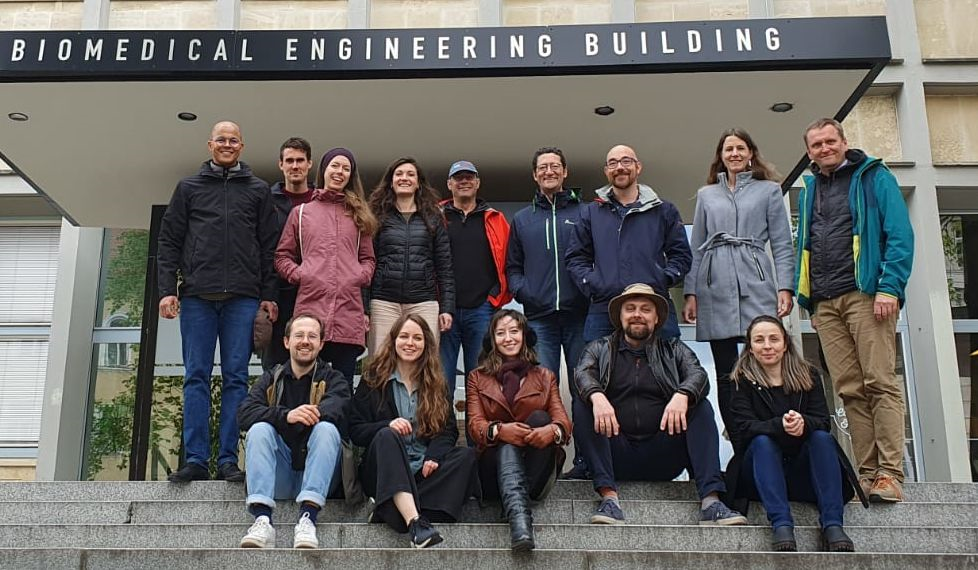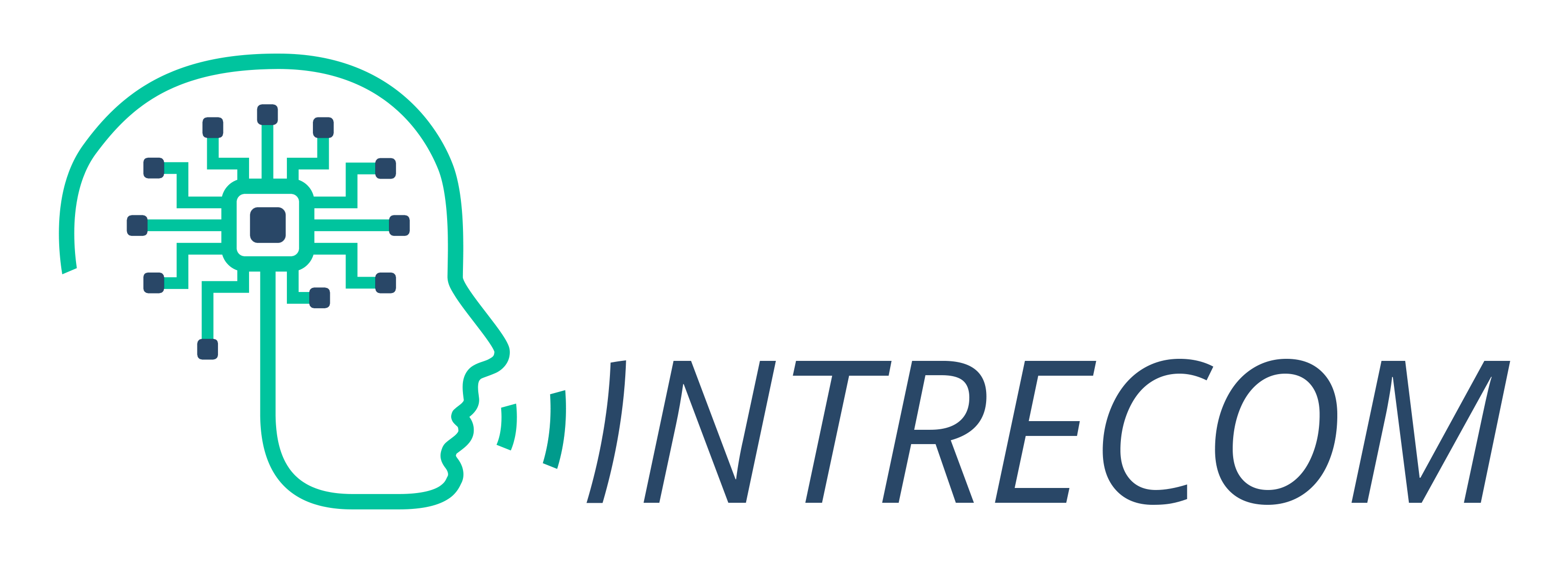Our mission
People with motor neuron disorders, trauma or stroke risk losing complete muscle control leading to Locked-In Syndrome (LIS), which leaves them completely paralysed and unable to communicate. Intracranial Neuro Telemetry to REstore COMmunication (INTRECOM) will provide a breakthrough for people with LIS, by developing a novel, fully implantable Brain-Computer Interface (BCI) technology that allows for real-time speech decoding and use in the home environment. This BCI system will significantly transcend current technology by providing a high-resolution and sustainable device, combining state-of-the-art hardware and software solutions based on Artificial Intelligence (AI) to liberate people with LIS from their isolation.
The technical breakthroughs of INTRECOM:
• Breakthrough BCI hardware: 1) High-density 128-channel ECoG electrode grids along with 2) a miniaturized wireless electronics unit with amplifier (0.4 cm thick) and 3) implantable connectors that allow for electronics unit replacement while keeping electrodes in place. This hardware will 4) remain operational 24/7 for >10 years and 5) is inductively charged.
• Breakthrough BCI software: 1) Machine learning decoding software that is able to directly translate brain signals to computer speech 2) with a maximum 1 second delay;
• At home application: Implanted ALS patients will be able to use the INTRECOM system to efficiently communicate with family and caretakers at home.
The INTRECOM project is funded by the Horizon Europe EIC Pathfinder Challenge.
Partners

University Medical Center Utrecht (UMCU)
The coordinator of INTRECOM is UMCU, a large academic hospital within the Netherlands that is part of the Utrecht University campus, which hosts 7 faculties. UMCU has over 12,000 employees and strong research and education programs in imaging and neuroscience.
The brain-related research and educational activities of UMCU are covered by the UMC Utrecht Brain Center, which aims “to perform high-level research in clinical and experimental neuroscience, whilst delivering an exceptional standard of care”. The faculty expertise of the Center is highly multi-disciplinary, and focuses on five research themes, being Developmental disorders, Epilepsy, Neuromuscular disorders, Neuro-oncology and Psychotic disorders. The UMC Utrecht Brain Center connects researchers and clinicians from a wide range of Departments of the UMCU, including the Departments of Neurology, Neurosurgery, Rehabilitation medicine, Anesthesiology, Otorhinolaryngology and others, and has strategic alliances with a number of external institutes.
People involved:
- Nick Ramsey (PI)
- Erik Aarnoutse
- Mariska van Steensel
- Julia Berezutskaya
- Sifra Blok
- Maria Kromm
TU Graz
The Institute of Neural Engineering at Graz University of Technology is an internationally renowned research institution with focus on brain-computer communication and dynamics of brain oscillations. We have extensive expertise in brain signal recording and analyses, established one of the first EEG-based BCIs almost 30 years ago. Since, the Graz BCI group contributed in various aspects to the community.
In the INTRECOM project, TU Graz will develop several methods for cursor control and communication and will be responsible for the implantation, supervision and support of one person with the INTRECOM system.
People involved:
- Gernot Müller-Putz
- Kyriaki Kostoglou
- Markus Crell
- Johanna Egger
- Patrick Suwandjieff
Wyss Center
The Wyss Center is an independent, non-profit, research and development organization that advances our understanding of the brain to realize therapies and improve lives.
The Wyss Center staff, together with the Center’s academic, clinical and industrial collaborators, pursue innovations and new approaches in neurobiology, neuroimaging and neurotechnology.
Wyss Center advances reveal unique insights into the mechanisms underlying the dynamics of the brain and the treatment of disease to accelerate the development of devices and therapies for unmet medical needs.
The Wyss Center was established by a generous donation from the Swiss entrepreneur and philanthropist Hansjörg Wyss in 2014. Additional resources from funding agencies and other sources help the Wyss Center accelerate its mission.
People involved:
- Tracy Laabs (Co-PI)
- Jonas Zimmermann (Co-PI)
- Shenandoah Montamat
- David Ibanez
- Janir Ramos da Cruz
CorTec
CorTec is a young MedTech company that was founded in Freiburg, Germany, in September 2010. As leading experts for innovations in the field of medical engineering CorTec is following the vision to take implantable neurotechnologies to the next level. With its technology, CorTec enables their customers to develop novel and effective therapies and medical devices.
In the INTRECOM project, CorTec will develop and provide the implantable hardware that will pick up the brain signals: customized high-resolution ECoG electrodes with high-channel cabling and novel implantable connectors.
People involved:
- Martin Schüttler
- Miguel Ulloa
- Hamed Karkan
- Benjamin Burg
Advisory Board
The INTRECOM advisory board will consist of external advisors that advise on the scientific, exploitation, ethical, OS, and patient perspective aspects of our project.
• Prof. Tim Denison, University of Oxford (Technology and commercialization)
• Prof. Marcel van Gerven, Radboud University Nijmegen (Machine learning, AI);
• Dr. Ghislaine van Thiel, UMCU (Ethics);
• Rinze Benedictus (Open Science advice);
• Mrs. Conny van der Meijden, ALS foundation, the Netherlands (User representative)

